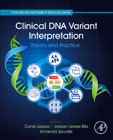
Clinical DNA Variant Interpretation: Theory and Practice
Lázaro, Conxi
Lerner-Ellis, Jordan
Spurdle, Amanda
Patrinos, George P.
We live in a very exciting time in the field of human genetics; NGS technology is generating enormous amounts of data for classifying genetic variants. However, defining the role of these variants in human health and disease can be difficult, especially when a variant's mechanism of action or the phenotype associated with a genetic mutation are not well defined. Work in multidisciplinary teams and development of multifactorial algorithms, including artificial intelligence and machine learning approaches, are integral to streamlining variant classification. Clinical DNA Variant Interpretation: Theory and Practice, a new volume in the Translational and Applied Genomics series, brings more than thirty international experts together to compile variant interpretation best practices and approaches in a single volume, covering foundational aspects, modes of analysis, technology, disease and disorder specific case studies, and clinical integration. This book provides a deep theoretical background, as well as applied case studies and methodology, enabling researchers, clinicians, and healthcare providers to effectively classify DNA variants associated with disease and patient phenotypes. Practical chapters discuss genomic variant interpretation, terminology and nomenclature; international consensus guidelines; population allele frequency; functional evidence transcripts for RNA, proteins, and enzymes; somatic mutations and somatic profiling; CNV interpretation; quantitative modeling; machine learning approaches; genomic data sharing; genetic testing in clinical practice; and holistic case-level interpretation. Biomedical specialties of relevance include internal medicine, medical genetics, oncology, psychiatry, neurology, and immunology, and those driving implementation of precision medicine and personalized treatments. Compiles best practices, methods, and sound evidence for DNA variant classification in one, applied volumeFeatures chapter contributions from international leaders in the fieldIncludes practical examples of variant classification for common and rare disorders and across clinical phenotypes INDICE: Section I. Theorethical Framework 1. Introduction: The challenge of genomic variant interpretation 2. General considerations: Terminology and standards 3. International Consensus Guidelines (ACMG, ClinGen ...) 4. Clinical and genetic evidence and population evidence 5. Functional evidence (I) Transcripts and RNA splicing 6. Functional evidence (II) Proteins and enzyme function and large scale mutagenesis 7. Functional evidence: model organisms 8. Somatic variant interpretation 9. Use of somatic mutations/somatic profiling to classify germline mutations 10. CNV interpretation 11. Quantitative Modelling : Multifactorial integration of data 12. The computational approach to variant interpretation: principles, results, and applicability 13. Data sharing and databases 14. Holistic case-level interpretation 15. Pharmacogenomics and Personalized Medicine 16. Use of genetic testing in clinical practice. Case-level interpretation of diagnostic testing Section II. Practical Cases 17. Hereditary Cancer 18. Inherited Heart Diseases 19. Epilepsy 20. Phenylketonuria 21. Hearing loss 22. Familial hypercholesterolemia 23. RASopathies 24. Summary
- ISBN: 978-0-12-820519-8
- Editorial: Academic Press
- Encuadernacion: Rústica
- Páginas: 464
- Fecha Publicación: 01/11/2020
- Nº Volúmenes: 1
- Idioma: Inglés
